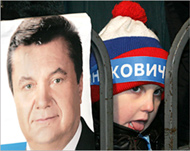Profile: Viktor Yanukovich
Moscow’s favoured man, Ukrainian Prime Minister Victor Yanukovich, declared president in November’s now contested general elections, is the epitome of the former Soviet-era party boss.

Amid huge protests around the country by supporters of his opposition candidate, Viktor Yushchenko, Yanukovich has agreed to a supreme court decision ruling voter fraud.
The court has annuled the elections of 21 November and announced a fresh round of voting for 26 December.
Troubled upbringing
Prime minister since November 2002, Yanukovich was born in the town of Yenakiyeve, Donetsk, in July 1950, to a family of metal workers.
In his early childhood, he became an orphan and was largely raised by his Belarussian grandmother in the working-class district of Makiivka.
Before he began his steady climb to political power, he had several brushes with the law.
Twice he was jailed for violent crimes, spending almost four years in prison for robbery and assault, though the charges were later dropped.
Working to success
In 1972, Yanukovich went on to study mechanical engineering, briefly spending time working in the capital Kiev on key infrastructure development projects, according to his official biography.
He was then appointed chief manager of a transport company in his home town and admitted to the Communist party.
After successfully increasing revenues for the company, the local politburo appointed Yanukovich as a transport administrator for the Soviet Union’s coal-mining industry in eastern Ukraine.
Over the next two decades, he built a reputation for himself as a tough manager and became highly adept in dealing with the central bureaucracy.
Governor
In 1997, Yanukovich’s political star began to rise when he was appointed governor of his region Donetsk, home to a three million largely Russian-leaning (and -speaking) population.
A key economic hub, Donetsk has long served as the industrial backbone of Ukraine, producing everything from coal to cars.
Close to powerful local oligarch Rinat Akhmetov (now Ukraine’s wealthiest man), Yanukovich was able to advance the political and business interests of the city.
Donetsk secured unprecedented levels of investment during his governorship and he was recognised as Ukraine’s “Regional Leader of the Year” in 2000.
Asked once how he was able to deal with all the corruption in the region, Yanukovich replied that he always preferred the “red-hot poker stick” treatment to manage problems.
Prime minister
In November 2002, President Leonard Kuchma (who is supporting Yanukovich’s bid for the presidency) named him prime minister in a surprising but popular announcement.
 |
|
A child at a Yanukovich rally in |
In office, he increased state regulation of the economy and imposed price controls to resolve a food crisis.
He has helped increase average wages to almost double their previous standing and has raised pensions with the help of privatisation proceeds.
Yanukovich has remained a strong defender of the currency hryvnia and has been keen to boost the employment market while also helping exporters.
“I came from a very poor family and my main dream in life was to break out of this poverty,” he told journalists, explaining the principal reason behind his drive for Ukrainian economic strength.
Ukraine and Russia ties
As prime minister he has sought closer ties with Russia, promoting the Russian east of the country and even suggesting that Russian be made an official language alongside Ukrainian.
(Hailing from a largely Russian-speaking region, Yanukovich has often found it difficult to speak in fluent literary Ukrainian and often switches to Russian when dealing with difficult subjects).
He is clearly the presidential candidate most favoured by Russia’s Vladimir Putin and Moscow has provided him with photo opportunities galore, including a highly publicised televised get-together with President Putin on his birthday.
The campaign
Despite enjoying Putin’s support, Yanukovich has seemed out of his depth – both during the last campaign and the ongoing political crisis.
He has reversed political positions and, at one point, openly pledged to support a free press and transfer some presidential powers to the legislature before backtracking.
Opponents have regularly made fun of his genial but wooden-tongued sentences and ridiculed his gangly appearance – he is almost two metres tall (6ft 6in).
Strongly backed by political forces close to the outgoing President Kuchma, he has not burnished a strong image.
Recently, he was widely ridiculed in an infamous “egg incident”, when an opposition activist threw an egg at him in public and Yanukovich collapsed to the ground, groaning and clutching his chest.